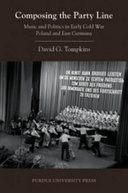Explore

Composing the party line : music and politics in early cold war Poland and East Germany
David Tompkins G.
2013
5 Ungluers have
Faved this Work
Login to Fave
Examines the exercise of power in the Stalinist music world as well as the ways in which composers and ordinary people responded to it. A comparative inquiry into the relationship between music and politics in the German Democratic Republic and Poland from the aftermath of World War II through Stalin's death in 1953, concluding with the slow process of de-Stalinization in the mid-to-late 1990s. This book examines the exercise of power in the Stalinist music world as well as the ways in which composers and ordinary people responded to it. It presents a comparative inquiry into the relationship between music and politics in the German Democratic Republic and Poland from the aftermath of World War II through Stalin’s death in 1953, concluding with the slow process of de-Stalinization in the mid- to late-1950s. The author explores how the Communist parties in both countries expressed their attitudes to music of all kinds, and how composers, performers, and audiences cooperated with, resisted, and negotiated these suggestions and demands. Based on a deep analysis of the archival and contemporary published sources on state, party, and professional organizations concerned with musical life, Tompkins argues that music, as a significant part of cultural production in these countries, played a key role in instituting and maintaining the regimes of East Central Europe. As part of the Stalinist project to create and control a new socialist identity at the personal as well as collective level, the ruling parties in East Germany and Poland sought to saturate public space through the production of music. Politically effective ideas and symbols were introduced that furthered their attempts to, in the parlance of the day, “engineer the human soul.” Music also helped the Communist parties establish legitimacy. Extensive state support for musical life encouraged musical elites and audiences to accept the dominant position and political missions of these regimes. Party leaders invested considerable resources in the attempt to create an authorized musical language that would secure and maintain hegemony over the cultural and wider social worlds. The responses of composers and audiences ran the gamut from enthusiasm to suspicion, but indifference was not an option. This title was made Open Access by libraries from around the world through Knowledge Unlatched.
This book is included in DOAB.
Why read this book? Have your say.
You must be logged in to comment.
Rights Information
Are you the author or publisher of this work? If so, you can claim it as yours by registering as an Unglue.it rights holder.Downloads
This work has been downloaded 2011 times via unglue.it ebook links.
- 207 - pdf (CC BY-NC) at OAPEN Library.
- 490 - pdf (CC BY-NC) at Unglue.it.
- 456 - pdf (CC BY-NC) at Internet Archive.
Keywords
- 20th century
- Cold War
- East Germany
- Germany (East)
- History
- Interdisciplinary Studies
- KUnlatched
- Music
- Musicology
- Nonfiction
- Poland
- Polish United Workers' Party
- Political aspects
- Reference, information & interdisciplinary subjects
- Regional studies
- Social conditions
- Socialist Realism
- Socialist Unity Party of Germany
- Soviet Union
Links
DOI: 10.5703/1288284315191Editions




